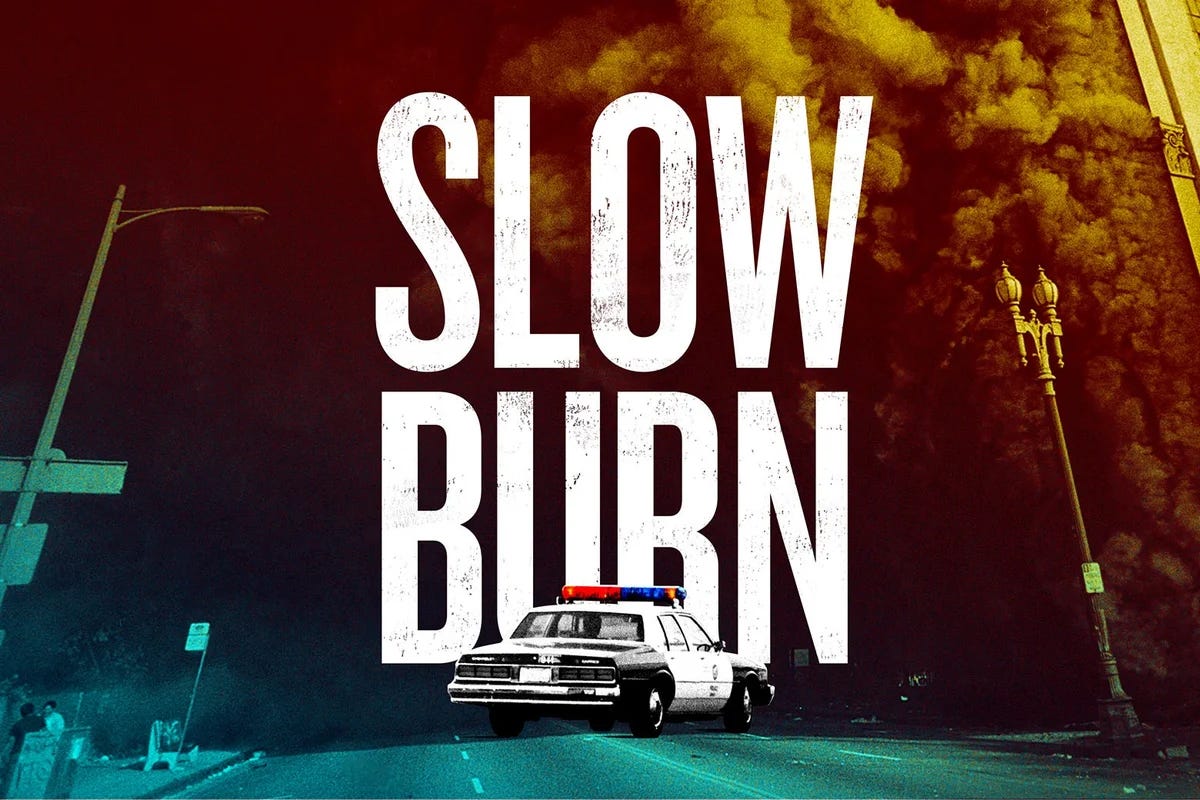I graduated college with a journalism degree (which I proceeded to do nothing with for many years), but I don’t remember undergrad as a particularly formative experience. No one taught me to chase down a source or obtain confidential documents or anything, you know, useful—I had to learn that on my own later on. I do remember, however, having to read Truman Capote’s In Cold Blood, which I was struck by. It exhibits some common perilous traits of long-form journalism: the exploitation of real people’s pain, a blurring of the lines between reporting and participating, and the temptation to cut corners in service of a gripping narrative. But it also perfectly showcases what the best non-fiction can do: encapsulate a whole time and place (as well as a social issue) in a single, true story. And you don’t need a journalism degree to experience that—you just need to checkout these recs!
A docuseries: Nisman: The Prosecutor, the President, and the Spy
The pitch: it’s the “who killed JFK” of Argentina—but in this case the victim is a prosecutor, and the (possible) murder suspect is the president herself.
Me gusta porque: on January 18, 2015, Argentinian prosecutor Alberto Nisman was found dead in his apartment, next to a handgun, apparently having shot himself. There wouldn’t be much reason to doubt that assumption if it wasn’t for the fact that Nisman was expected in Congress the next day, to present findings that (according to him) would’ve implicated the then Argentinian president, Cristina Fernández de Kirchner, in the coverup of one of the Western Hemisphere’s most heinous terrorist attacks: the 1994 bombing of a Jewish center in Buenos Aires that killed 85 people and injured hundreds more. Nisman had been working the case for over 10 years, and had become convinced the Kirchner administration, by signing a “memorandum of understanding” with Iran that would supposedly allow the suspects to be brought to justice, was instead shielding them from INTERPOL warrants in exchange for improved trade relations between the two countries. In that context, the idea that Nisman killed himself hours before presenting his report to the people who could bring the administration to justice strains credibility—but so does the theory that he was killed, which means believing in a conspiracy that we still have no tangible proof of. The case is Holmesian in its details (I’ve learned too much about gunpowder traces), and this docuseries by Justin Webster—in spite of lasting more episodes than it should—is terribly engrossing as it dives not just into Nisman’s death itself but also its implications to national politics. In a sharply divided Argentina still grappling with the scars of the Dirty War, people’s opinions of what happened to the prosecutor become shorthand for their political beliefs, while Nisman himself almost fades away as he joins the death toll of the very case he was investigating.
Wait, why is the current Argentinian president giving an interview for this documentary? I was quite amused to see Alberto Fernández (no relation to Fernández de Kirchner) speak on camera to say he doubted Nisman killed himself—at the time, he didn’t know that he’d go on to become the country’s president, with Kirchner as his VP (or, depending on who you believe, his puppet master). He has now, of course, changed his mind about the case.
Where? On Netflix.
I’ve already watched it! Then send me your theories! And chase it with another Argentinian Netflix production, The Kingdom, a fictional account of an Evangelical pastor who becomes a presidential frontrunner when he’s added as VP to the ticket of a candidate who is then stabbed mid-campaign. The show smartly comments on the country’s political fracture, which makes allies of people who’d otherwise despise each other, all under the watchful gaze and stern hand of—who else—the United States. Any similarities to real life are possibly (but plausibly deniable) on purpose.
A book: Empire of Pain
The pitch: Succession but it’s Big Pharma instead of the media, and the death toll of “no real people involved” has now crossed the 1-million mark.
Me gusta porque: I wish this didn’t keep happening, but mirroring a recommendation I made in the first-ever edition of this newsletter, here’s another story of a “horrifying unregulated experiment in which ordinary people acted as lab rats” that you must read—this time, about the opioid epidemic, as triggered by not-so-miraculous drug OxyContin. There are plenty of books about the subject (I first became aware of it through Hulu’s Dopesick, adapted from the book of the same name), but what sets Patrick Radden Keefe’s investigation apart is its focus on the Sackler family, who own and run Purdue Pharma, creator of OxyContin. To learn that opium is yet to be successfully tamed (heroin was created, after all, as a commercial drug), and that OxyContin’s claims to have done so were highly questionable, did not really surprise me. What gripped me, as someone who works in a non-profit, is how the Sackler money was washed clean by their incessant philanthropic efforts, and Keefe recounts in blood-boiling detail the lengths to which institutions like the Met or the Smithsonian doubled over to get even scraps of that wealth. We want to believe that non-profits represent a kinder side of humanity, but Keefe makes the point that donors’ expectations on how they should be treated for their generosity may make the non-profit complex a way to take from the rich to give to… the rich. The book can be uneven (it covers the epidemic itself in long, somewhat perfunctory manner) and, being an expansion of Keefe’s reporting for The New Yorker, one could be tempted to just read that article and call it a day, but I still found it quite compelling—particularly when the courts fail to properly hold the Sackers accountable and they are punished instead by seeing their name erased from the countless galleries, exhibits, and scholarships that were supposed to make them immortal.
Where? Penguin Random House.
You mentioned Dopesick but you didn’t say whether I should watch it! Because I didn’t feel quite moved by it either way (if I’d hated it, I wouldn’t have mentioned it). Unlike Keefe’s book, it didn’t choose a specific angle, trying instead to tell all stories, which didn’t totally pay off for me. But as an intro to the opioid epidemic, it can be very impactful, and watched it all the way through!
I’ve already read it! Then chase it with Reeves Wiederman’s Billion Dollar Loser—if Empire of Pain taught you to be wary of donors, this one will teach you to be wary of board members, the kind that let WeWork’s manic funder Adam Neumann do whatever he wanted as long as the company’s valuation kept growing, and only really acted to prevent further harm to employees and clients once it became clear he was hurting the bottom line. If you think capitalism is bad, you haven’t met its deranged cousin, venture capitalism!
A podcast: Slow Burn: The L.A. Riots
The pitch: a comprehensive revisiting of the Rodney King riots that, like every Slow Burn story, will remind you that humanity is stuck in a loop.
Me gusta porque: I have to admit I was not enthralled by the hit first season of Slow Burn, which tackled Watergate—it might be that the story itself has never interested me much, in part because the kind of political corruption I grew up with would make Nixon blush. But when I heard about Slow Burn’s latest season, I felt a pull: I first learned about the 1992 L.A. riots via The People Vs. O. J. Simpson, which starts with footage of Rodney King’s beating and mentions the riots in multiple episodes, so I was intrigued about the podcast providing new insight into a series I’ve watched so many times I could probably recite all the lines. And it did! Host Joel Anderson does painstaking work in exploring every facet of the riots, from the videotape of the beating that was seen all over the world to the trial and exoneration of the officers who assaulted King—as well as other factors, like the killing of Latasha Harlins, that help explain the fury of the uprising. Anderson scores some pretty big interviews—including George Holliday, the man who videotaped the beating, whom Anderson talked with just before he passed away—and while the podcast doesn’t always go as deep as I would’ve wanted (particularly in an episode dedicated to humanizing King, which left me wanting more), it does an impressive job at grappling with the complexities of the story (like the fact that King was not a supporter of the riots) instead of tying things up in a 2022-acceptable bow.
Where? Slate.
You mentioned The People Vs. O. J. Simpson—let me stop you right there. It’s not time to talk about The People Vs. O. J. Simpson yet. It deserves its own newsletter. Perhaps a whole book? Anyway, I’ll let you know when it’s time to talk about it.
Jeez. I’m just looking for recommendations, man. Sorry! I will say: it’s always time to watch The People Vs. O. J. Simpson, regardless of whether you’ve heard Slow Burn (I, for example, just rewatched it for the hundredth time—now with my family, whom I provided with real life factoids they didn’t ask for). But I can’t discuss it in a footnote!
WHATEVER. I’ve already listened to it [Slow Burn]! Then watch O. J.: Made in America, the Ezra Edelman’s docuseries which also covers the Rodney King riots and draws a clear line from the policemen who assaulted King getting off free to Simpson doing the same (a juror in the Simpson case literally says their not-guilty verdict was revenge against the LAPD). At 7-plus hours, the doc perhaps covers too much, but it’s nice to get the aspects of the story (like O. J.’s football and movie careers) that The People Vs. O. J. Simpson only alludes to.





